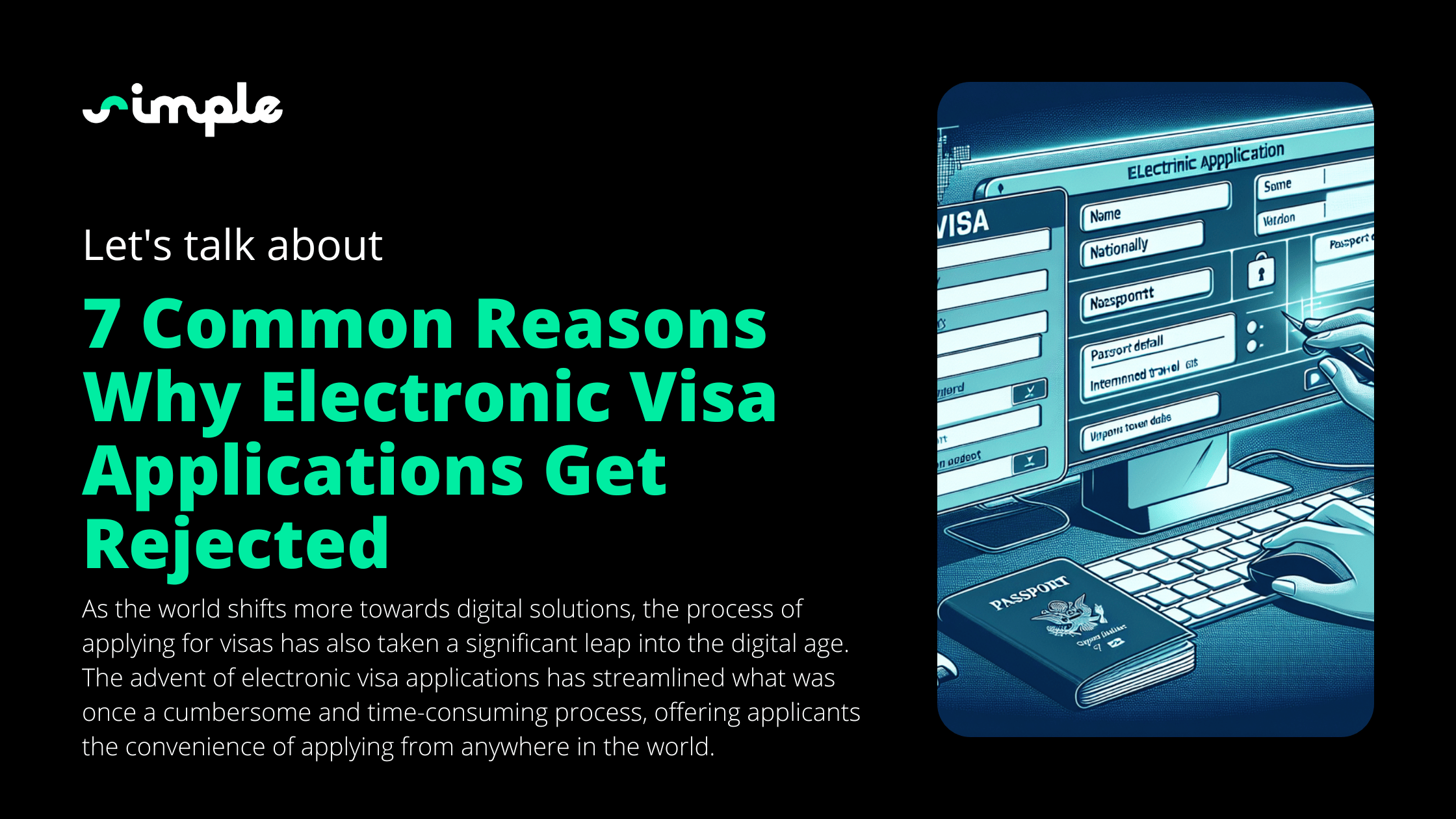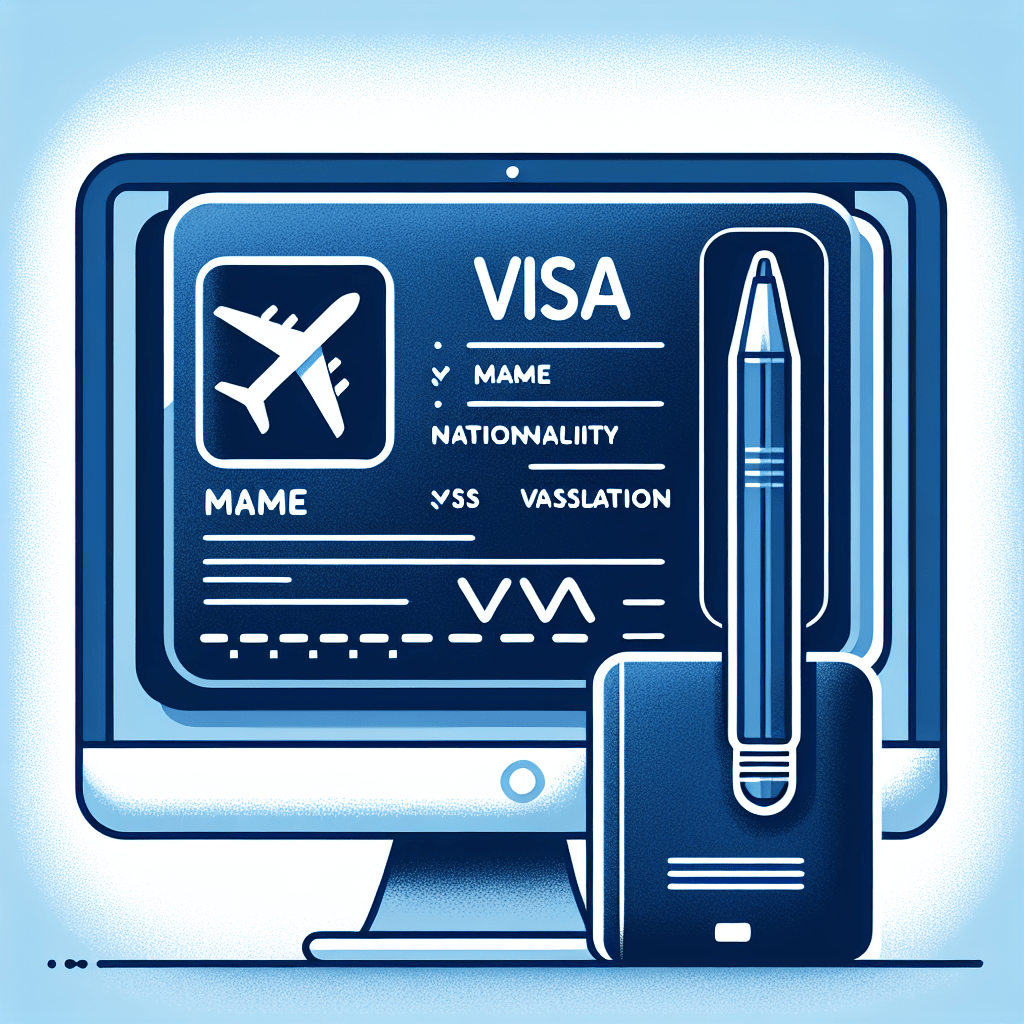7 Common Reasons Why Electronic Visa Applications Get Rejected

As the world shifts more towards digital solutions, the process of applying for visas has also taken a significant leap into the digital age. The advent of electronic visa applications has streamlined what was once a cumbersome and time-consuming process, offering applicants the convenience of applying from anywhere in the world. However, this ease of access does not guarantee success. A considerable number of e-visa applications face rejection due to a variety of common mistakes and oversights.
Understanding the intricacies of the electronic visa application process is crucial. The digital platform, while user-friendly, requires precise information and adherence to specific guidelines that, if not followed, lead to the rejection of the application. The reasons for these rejections are often simple yet overlooked details or misunderstandings about the requirements. For applicants, recognizing and avoiding these pitfalls is essential to navigate the process successfully and secure their electronic visa without unnecessary delays or complications.
With the right knowledge and preparation, applicants can significantly increase their chances of approval. This discussion aims to shed light on the most common reasons for e-visa application rejections, providing valuable insights for those looking to understand the process better and enhance their prospects of a favorable outcome.

Detailed Discussion on Incomplete Application Forms
How Lack of Required Information Can Lead to Immediate Rejection
One of the most common stumbling blocks in the e-visa application process is the submission of incomplete forms. The digital visa system, designed for efficiency and accuracy, relies heavily on the completeness of the information provided. Missing details, no matter how minor they may seem, can trigger an automatic rejection of the application. This is because the electronic visa platform employs algorithms that screen applications for completeness before they even reach a human reviewer. Therefore, omitting information related to personal details, travel history, or supporting documents can halt the process abruptly.
Importance of Thoroughly Reviewing and Confirming All Entries Before Submission
To navigate the online visa service successfully, applicants must exercise meticulous attention to detail. Before hitting the submit button on a digital visa application, it is crucial to review every entry and ensure that all required fields are accurately filled. This includes double-checking personal information, travel dates, passport details, and the specifics of any accompanying documents. The electronic travel authorization process is unforgiving of errors and omissions, making this step critical. Additionally, many electronic visa platforms offer a final review or a summary page before submission, which should be used as an opportunity to catch and correct any mistakes. This careful approach not only increases the chances of online visa approval but also streamlines the visa electronic processing, making it smoother and faster for both the applicant and the authorities.

Deliberation on the Impact of Errors in Personal Information
The Repercussion of Inconsistencies in Details Such as Name, Birth Date, Passport Number, and Country of Residence
Errors in personal information can severely derail the e-visa application process. Inconsistencies in critical details such as name, birth date, passport number, and country of residence are red flags in the digital visa system, often leading to immediate rejection. The reason behind this strict scrutiny is the need for absolute accuracy in identifying individuals who are crossing international borders. The electronic visa platform is designed to cross-reference information with global databases, and any discrepancy, no matter how minor, can raise security concerns. This is particularly true for electronic travel authorization, where the integrity of the data provided is paramount. An error as simple as a misspelled name or an incorrect passport number can not only result in the denial of the application but may also flag the applicant for further scrutiny in future attempts.
Tips on Ensuring That the Information Provided is Accurate and Identical to Official Records
To ensure a smooth e-visa application process and increase the likelihood of online visa approval, applicants must take several steps to verify the accuracy of their information. First, it is advisable to have all necessary documents, including the passport and any other identification documents, on hand while filling out the digital visa application. This allows for direct comparison and reduces the risk of discrepancies. Secondly, applicants should cross-check the information they provide with the details in their official documents, paying close attention to spellings, dates, and numbers. Another useful tip is to have a second pair of eyes review the application before submission. This could be a friend or a family member who can spot errors that the applicant might have overlooked. Lastly, utilizing the e-visa status check feature available on many electronic visa platforms can provide applicants with updates and alerts in case any issues arise with their submitted information, allowing for timely corrections and resubmissions if necessary.

Examination on Other Typical Issues
The Consequences of Having a Criminal Record and Not Disclosing It During Application
Transparency is a cornerstone of the e-visa application process. Applicants with a criminal record face a critical juncture when applying for an electronic entry permit. Failing to disclose such information can have severe repercussions, as most digital visa systems include background checks as part of the visa electronic processing. The discovery of a criminal record, especially if not disclosed by the applicant, can lead to immediate rejection and potentially ban the applicant from future applications. It’s important to note that having a criminal record does not automatically disqualify someone from receiving an electronic travel authorization, but honesty about one’s past is crucial. Many countries consider the nature of the offense, rehabilitation, and time elapsed since the incident when making their decision.
The Role of Financial Capacity in E-Visa Application with Emphasis on Providing Proof of Funds
Proof of financial capacity is a common requirement in the e-visa eligibility criteria. Applicants must demonstrate that they have sufficient funds to cover their stay and any related expenses during their visit. This is a measure to ensure that visitors will not become a financial burden on the host country. Failure to provide adequate proof of funds can lead to rejection of the digital visa application. Applicants are advised to submit official bank statements or similar documents that clearly show their financial standing. It’s also important to understand the specific financial requirements of the destination country, as these can vary significantly.
How Failure to Show Ties to Home Country or Purpose of Visit Could Lead to Rejection
One of the online visa requirements that applicants sometimes overlook is the need to demonstrate strong ties to their home country and a clear purpose of visit. Immigration authorities use this information to assess the likelihood of an applicant overstaying their visa. Applicants should provide evidence of employment, family, property, or educational commitments in their home country that necessitate their return. Similarly, a clear itinerary or letters of invitation can help clarify the purpose of the visit. Lack of such documentation can raise doubts about the applicant’s intentions, leading to rejection.
4. The Effect of Previous Visa Rejections on Current Application
Previous visa rejections can impact current e-visa applications, but they do not necessarily preclude the possibility of online visa approval. What is crucial is how applicants address the reasons for past rejections in their new application. The electronic visa platform often allows for a section where applicants can explain any previous denials and what has changed since then. This could include improved financial standing, stronger ties to the home country, or a clearer travel plan. Demonstrating an understanding of why the previous application was rejected and showing that the issues have been resolved can positively influence the decision on the current application.

Conclusion
Navigating the e-visa application process successfully hinges on an applicant’s ability to avoid common pitfalls that lead to rejection. As we have explored, incomplete application forms, errors in personal information, undisclosed criminal records, insufficient proof of financial capacity, unclear ties to the home country, and ignoring the impact of previous visa rejections are among the top reasons applications are denied. Recognizing and addressing these issues is not just about adhering to the procedural requirements of the digital visa system; it’s about understanding the underlying concerns of immigration authorities regarding security, financial independence, and the genuine intent of travel.
To increase the chances of online visa approval, applicants must approach the process with diligence and honesty. Diligence is reflected in the meticulous completion of the application, ensuring that all information is accurate, complete, and consistent with official documents. It involves a thorough review of the e-visa eligibility criteria and the submission of a well-prepared application that leaves no room for doubt about the applicant’s qualifications or intentions. Honesty, on the other hand, is about transparency regarding one’s background, financial status, and reasons for traveling. Even when certain aspects of an applicant’s profile or history might seem disadvantageous, disclosing them openly and providing context can be more favorable than omission or deception.
In conclusion, while the digital visa application process offers convenience and accessibility, it also demands attention to detail and integrity from applicants. By avoiding common mistakes and approaching the application with diligence and honesty, applicants can significantly enhance their prospects for approval. Remember, the goal of the electronic visa platform is not to hinder travel but to facilitate it securely and efficiently for qualified individuals. With the right preparation and mindset, securing an electronic travel authorization can be a straightforward and positive experience.